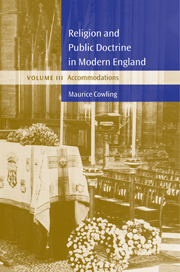Book contents
- Frontmatter
- Contents
- Foreword and acknowledgements
- Introduction
- I The Christian intellect and modern thought in modern England
- 1 The reanimation of Protestantism I
- 2 Christianity and literature I
- 3 The reanimation of Protestantism II
- 4 The enlargement of Christianity
- 5 Christianity and literature II
- 6 Christianity and modern knowledge I
- 7 Whiggism, Liberalism and Christianity I
- 8 Whiggism, Liberalism and Christianity II
- 9 Christianity and modern knowledge II
- 10 Christianity in an unfriendly world I
- 11 Christianity in an unfriendly world II
- 12 Christianity in an unfriendly world III
- 13 Christianity in an unfriendly world IV
- 14 Christianity in an unfriendly world V
- II The post-Christian consensus
- III Conclusion: religion and public doctrine in modern England
- Notes
- Index of proper names
1 - The reanimation of Protestantism I
Published online by Cambridge University Press: 23 December 2009
- Frontmatter
- Contents
- Foreword and acknowledgements
- Introduction
- I The Christian intellect and modern thought in modern England
- 1 The reanimation of Protestantism I
- 2 Christianity and literature I
- 3 The reanimation of Protestantism II
- 4 The enlargement of Christianity
- 5 Christianity and literature II
- 6 Christianity and modern knowledge I
- 7 Whiggism, Liberalism and Christianity I
- 8 Whiggism, Liberalism and Christianity II
- 9 Christianity and modern knowledge II
- 10 Christianity in an unfriendly world I
- 11 Christianity in an unfriendly world II
- 12 Christianity in an unfriendly world III
- 13 Christianity in an unfriendly world IV
- 14 Christianity in an unfriendly world V
- II The post-Christian consensus
- III Conclusion: religion and public doctrine in modern England
- Notes
- Index of proper names
Summary
The present aspect of spiritual Europe might fill a melancholic observer with doubt and foreboding. It is mournful to see so many noble, tender and high-aspiring minds deserted of that religious light which once guided all such: standing sorrowful on the scene of past convulsions and controversies, as on a scene blackened and burnt-up with fire; mourning in the darkness, because there is desolation, and no home for the soul; or what is worse, pitching tents among the ashes, and kindling weak earthly lamps which we are to take for stars. This darkness is but transitory obscuration: these ashes are the soil of future herbage and richer harvests. Religion, poetry, is not dead; it will never die.
(Thomas Carlyle, The State of German Literature, 1827, in Miscellaneous and Critical Essays, vol. I, 1899, pp. 85–6)If the convulsive struggles of the last Half Century have taught poor struggling convulsed Europe any truth, it may perhaps be this as the essence of innumerable others: that Europe requires a real Aristocracy, a real Priesthood, or it cannot continue to exist.
(Thomas Carlyle, Past and Present, 1843, p. 241)Of all Priesthoods, Aristocracies, Governing Classes at present extant in the world, there is no class comparable to that Priesthood of the Writers of Books.
(Thomas Carlyle, On Heroes and Hero Worship, 1840 (Everyman edition, p. 396))In this chapter a ‘reanimated’ Protestantism will be presented as a continuation of Reformation-virtue and Reformation-autonomy, as an heir to mediaeval Christianity insofar as mediaeval Christianity had not been abnormal, and as the religion for which the modern world had been waiting.
- Type
- Chapter
- Information
- Religion and Public Doctrine in Modern England , pp. 3 - 23Publisher: Cambridge University PressPrint publication year: 2001

